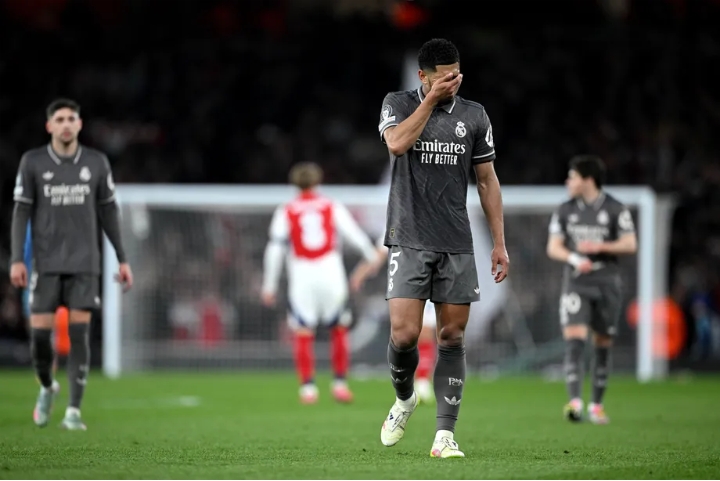Real Madrid’s Champions League dreams were torn up at the Emirates Stadium as a brace of Declan Rice free-kicks and a precise Mikel Merino finish gave Arsenal a 3-0 lead in the first leg of the quarter-final. To rub salt into the wound, Eduardo Camavinga was sent off late in injury time as he kicked the ball away, with his frustration getting the better of him.
. Who would play at full-back?
José Félix Díaz dropped a bombshell in Marca on Tuesday morning as he claimed that Carlo Ancelotti was preparing to line up with Lucas Vázquez at right-back and David Alaba at left-back, despite indications that Fede Valverde and Fran García were also in contention for those roles. In the end, he was only 50% right, as Valverde started on the right and Alaba got the nod over García on the left. That should perhaps not have been as surprising as it could seem, given Ancelotti’s lack of faith in Fran García against stronger opponents offensively. Alaba’s inclusion also added another aspect, which was some much-needed height. In the end, neither looked too uncomfortable, albeit tested in the one-on-one challenges posed by Bukayo Saka and Gabriel Martinelli.
. Would set pieces come matter?
Yes, but not the corners as initially feared. Pre-match, Carlo Ancelotti had told Kiyan Sobhani of Managing Madrid, “Arsenal are very dangerous from set pieces”, before adding, “we will try to defend as well as possible, we can also do damage when we have set pieces”. Nobody seemed to tell the players on the field, as Real Madrid had three corners but only got a shot away at one with Jude Bellingham’s low volley an easy save for David Raya. Defensively, the weakest set-up fell early on, when Thomas Partey fired a close range header goalwards. Arsenal only recorded one more shot from a corner, but continued to threaten. It was free-kicks instead that proved lethal.
How important will home advantage be in the second leg?
Real Madrid’s poor performance in the league stage meant that Los Blancos had to go to the Estadio Riyadh Air Metropolitano for the second leg of the last 16, and that was no easy task. This round gave the reigning champions home advantage at the Estadio Santiago Bernabéu for the return fixture, but they still had to go to London and, at the very least, keep the tie alive for next week’s match in Madrid. Real Madrid failed to do that. A 3-0 defeat means that the second leg will be a huge ask for Los Blancos back on home turf, and at a time when the last two home games have produced a draw (which ended in a 4-3 defeat in 90 minutes) to Real Sociedad, and a loss to Valencia.
Is there any hope for Real Madrid in the second leg?
Real Madrid are the comeback kings, but a 3-0 first leg defeat is not going to be easy to overcome. You’d have to go back to 1985/86, when Real Madrid came back from 5-1 down with a 4-0 win in the return leg against Borussia Monchengladbach. It’s only happened twice before then too, a year before with a 6-1 second leg win after a 3-0 defeat against Anderlecht, and in 1975/76 when a 4-1 loss to Derby County was overturned with a 5-1 win. It’s hard to envisage Arsenal, who haven’t conceded four in a single game since May 2023, falling in the same way. In fact, they’ve only conceded six in 10 games in the Champions League this season. And they’ll have the mental high of this first leg win.
Could Real Madrid have avoided Declan Rice’s superb free-kicks?
It’s been some time since such an inspired rival came up against Real Madrid in the big moments to decide a game. Declan Rice did just that with two free-kicks of incredible quality that make it hard to blame either Thibaut Courtois or the players in the wall ahead of him. The finishes were just that good. But, Real Madrid could have learned after the first, and avoided committing needless fouls in dangerous positions. Eight fouls committed is not a particularly high number, it’s two fewer than against Valencia at the weekend, for example, but there were several in dangerous positions which allowed Declan Rice a chance and that was all he needed. It was an indiscipline which is not characteristic of this side and was summarised with the unnecessary late red card to Eduardo Camavinga for kicking the ball away to collect a second yellow card.
Where was this game lost?
Trying to identify exactly where Real Madrid went wrong here is a big ask, but the starting point has to be in the midfield battle where Arsenal simply outpowered Real Madrid. While it may have been tricky to avoid the Gunners’ domination of possession in their own stadium, the English side were finding it far too easy to cut through the Real Madrid and slice through from defence to attack in seconds, as reflected in the move which led to Mikel Merino’s strike to make it 3-0. It was a poor night for Jude Bellingham with a match high of 10 duels lost, while Eduardo Camavinga was pinned back deep and Luka Modrić could not dictate play as he usually would, recording only eight passes into the final third and one chance created

